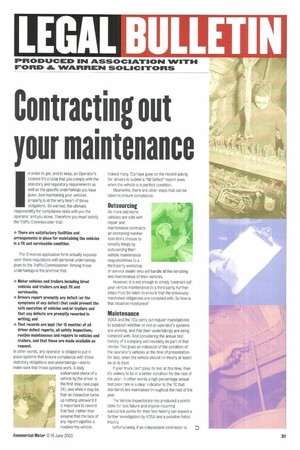LEGAL ULLET N
Page 31

If you've noticed an error in this article please click here to report it so we can fix it.
1:015t0OUCEI, 1141 ASSOCIATION! WITIFI FORD WILIFIREPI SOLICITORS
Contracting out your maintenance
n order to get, and to keep, an Operator's Licence it's crucial that you comply with the statutory and regulatory requirements as well as the specific undertakings you have given. And maintaining your vehicles properly is at the very heart of those obligations. Be warned, the ultimate responsibility for compliance rests with you the operator, and you alone. Therefore you must satisfy the Traffic Commissioner that: • There are satisfactory facilities and arrangements in place for maintaining the vehicles in a fit and serviceable condition.
The 0-licence application form actually expands upon these regulations with personal undertakings given to the Traffic Commissioner. Among those undertakings is the promise that: ▪ Motor vehicles and trailers including hired vehicles and trailers are kept fit and serviceable; ••••• Drivers report promptly any defect for the symptoms of any defect) that could prevent the safe operation of vehicles and/or trailers and that any defects are promptly recorded in writing; and • That records are kept (for 15 months) of all driver defect reports, all safety inspections, routine maintenance and repairs to vehicles and trailers, and that these are made available on request.
In other words, any operator is obliged to put in place systems that ensure compliance with those statutory obligations and undertakings—and to make sure that those systems work. A daily waikaround check of a vehicle by the driver is the first step (see page 34), and while it may be that an inspection turns up nothing untoward it is important to record that fact, rather than assume that the lack of any report signifies a roadworthy vehicle.
Indeed many TCs have gone on the record asking for drivers to submit a "Nil Defect" report even when the vehicle is in perfect condition.
Meanwhile, there are other steps that can be taken to ensure compliance.
Outsourcing
As more and more vehicles are sold with repair and maintenance contracts an increasing number operators choose to simplify things by outsourcing their vehicle maintenance responsibilities to a third-party workshop or service dealer who will handle all the servicing and maintenance of their vehicles.
However, it is not enough to simply 'contract out' your vehicle maintenance to a third party. Further steps must be taken to ensure that the previouslymentioned obligations are complied with. So how is that situation monitoredP
Maintenance
VOSA and the TCs carry out regular investigations to establish whether or not an operator's systems are working, and that their undertakings are being complied with. And considering the annual test history of a company will inevitably be part of that review. This gives an indication of the condition of the operator's vehicles at the time of presentation for test, when the vehicle should (in theory at least) be at its best.
If your truck can't pass its test at this time, then it's unlikely to be in a better condition for the rest of the year. in other words a high percentage annual test pass rate is a clear indicator to the TC that standards are maintained throughout the rest of the year.
The Vehicle inspectorate has produced a points table for test failure and anyone incurring substantial points for their test history can expect a further investigation by VOSA and a possible Public Inquiry.
Unfortunately, if an independent contractor is












































































































































































